Navigating Alcohol and Holiday Drinking
From Champagne to eggnog, it feels great raising a glass during the holidays… until it doesn’t.
Before heading into merry festivities, be sure to take time to understand distinct types of alcohol and their impact on your body.
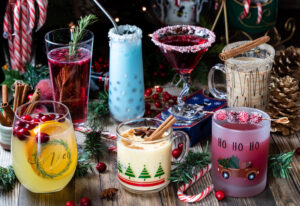 Does alcohol really have health benefits?
Does alcohol really have health benefits?
We’d be remiss not to preface that, like most indulgences, moderation is key. You’ve likely heard that certain alcohols have health benefits. In reality, the amount you would need to get the said benefit is extreme. Excessive drinking can slow your metabolism, weaken your immune system, and increase your risk for certain cancers and diseases.
Are some alcohols better than others?
Alcohol, in general, is processed by your body like a sugary dessert. That being said, you can approach your choices with consideration to the impact they have on your dietary goals.
Vodka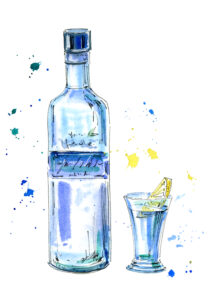
At the top of our list is vodka, a friendly choice for most diets. It’s filtered by charcoal, so your body will only process the alcohol and no other toxins. Potato vodka is a great choice because it is low in carbs, sugar free, and grain free.
Gin
Gin is flavored with juniper berries which do contain antioxidants. Originally used for medicinal purposes in ancient times, gin also has some properties that can improve circulation and decrease water retention. Gin can be paired with tonic water or club soda with a splash of cranberry juice to create a low-calorie cocktail.
Tequila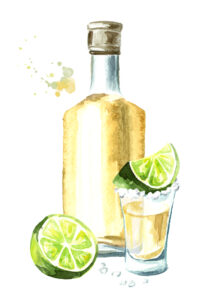
Tequila is another delicious and safe choice, as its one of the lowest alcohols in calories. Agavins, or the natural sugar found in tequila, are non-digestible. This means that you can get away with a drink of tequila without raising your blood sugar!
In addition, tequila is made from agave and is fermented to remove sugar. After this, it is distilled and filtered. This process leaves mostly pure alcohol, which makes this a better option compared to other spirits!
Whiskey
Whiskey contains ellagic acid which is known for its antioxidant properties. One serving has as many antioxidants as a glass of red wine, without the ochratoxin A and the high yeast levels of wine.
Whiskey is still made of grains, so it is higher in toxins than others. The distillation process helps to remove some of these toxins, but not all.
Dry Cider
Cider is gluten free. While mold toxins from grains found in beer survive the fermentation process, the ones made from apple do not. If you suffer from a yeast problem, cider can stimulate candida.
 Dry Champagne
Dry Champagne
Champagne is made from grapes from the Champagne region of France. Standards for champagne are high and tend to have the lowest amounts of mold toxins remaining after the fermentation process. There are varying levels of sugar in champagne, so it is best to go with brut or extra brut varietals.
Dry White Wine
Dry white wine has less mold toxins than regular white and red wines, but mold toxins may still be present because some white wines are unfiltered.
Liqueurs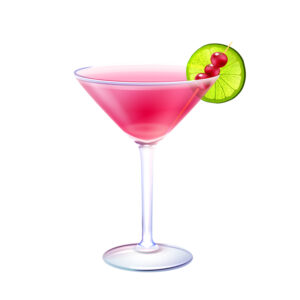
Liqueurs are distilled, but they typically contain more sugar and other additives that can be inflammatory.
Colored, Sweetened Spirits
While fun to look at, brightly colored cocktails are a nutrition red-flag. These are typically a bad dietary choice due to the amount of sugar, mold toxins, artificial coloring chemicals, and other additives. These beverages are highly inflammatory and can leave you feeling bloated after drinking.
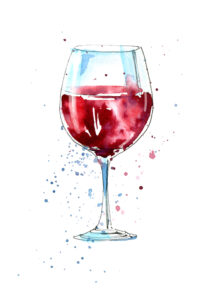 Red Wine
Red Wine
Red wine is high in ochratoxin A, a mycotoxin produced by fungi of improperly stored food products. Red wine also has high levels of yeast and is usually unfiltered, leaving all the work for your liver and kidneys.
Although red wine is popularly marketed to have antioxidants like resveratrol, it is not enough to outweigh the negative effects.
Beer & Lager
Beer is by far the dirtiest type of alcohol. It contains gluten, yeast, ochratoxin A, and mold toxins. If you are going to drink beer, opt for gluten-free to lessen the inflammatory effects from harmful toxins.
Cheers to your Health & Happiness
 This guide should give you the knowledge you need to make informed drinking decisions this holiday. Whether you will be going with a traditional gin drink or a non-alcoholic whiskey alternative, be sure to consume in moderation this season and make the choices that are right for your body.
This guide should give you the knowledge you need to make informed drinking decisions this holiday. Whether you will be going with a traditional gin drink or a non-alcoholic whiskey alternative, be sure to consume in moderation this season and make the choices that are right for your body.
If you’re interested in healthy drinking and eating all year round, our team of Functional Medicine providers and Clinical Nutrition experts can develop a personalized nutritional journey that helps you make the most of food all year.
We offer free consultations, virtual care, and are in-network with some insurance providers. Connect with our team by scheduling an appointment below!










